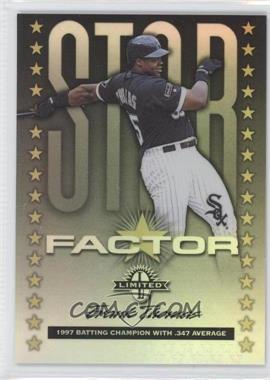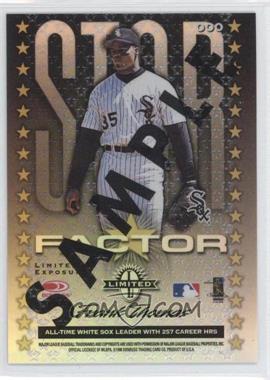1998 Donruss Limited
Description
1998 Donruss Limited was a proposed a 200-card release limited to less than 1000 total sets and intended for release in October, 1998. The product was never released due to Pinnacle Brands' bankruptcy. Similar to the previous year's release, this set was to be broken down into four different subsets featuring either a solo or combination of players that were categorized appropriately:
- Double Play
- Double Team
- Star Factor
- Double Vision
Unlike other Pinnacle Brands bankruptcy issues (i.e. 1998 Select and 1998 Pinnacle Certified), none of the cards from this set have surfaced on the secondary market and it is assumed that they were never printed.
A Frank Thomas promo card (see below) along with the sell sheets are the only reminders of this product's existence.
Insertion Ratios
| Cards | Total Cards | Numbered To | Hobby Odds |
|---|---|---|---|
| Base | 200 | - | ? |
| Double Play | 100 | - | ? |
| Double Team | 40 | - | ? |
| Star Factor | 40 | < 1000 | ? |
| Double Vision | 20 | - | ? |
| Limited Exposure Double Play | 100 | - | ? |
| Limited Exposure Double Team | 40 | - | ? |
| Limited Exposure Star Factor | 40 | < 40 | ? |
| Limited Exposure Double Vision | 20 | - | ? |
| Double Switch | 200 | 15 | ? |
| Fabric of the Game | ? | varies | ? |
| Fabric of the Game Die-Cut | ? | varies | ? |
Checklist
Base Set
A checklist for the base set was never released. However, the base set was supposed to feature 200 double-sided cards printed with Donruss's "exclusive Spectra-tech technology" and was to be divided into 4 subsets: Double Play, Double Team, Star Factor, and Double Vision. Additionally, each subset was to be inserted at a different rate, creating various shortprints throughout the base set. The subsets were:
Double Play
100 cards featuring players with similar styles of play or position. Two different players were to be featured on one card (one front, other on the back). According to the sell sheet, the following card was confirmed for this subset:
Wade Boggs/Kevin Orie
Double Team
40 cards featuring teammates that were paired together (one on front, other on the back). According to the sell sheet, the following card was confirmed for this subset:
Kenny Lofton/Jaret Wright
Star Factor
40 cards featuring the top stars in the game on both sides. Unlike the other subsets, Star Factor cards only featured one player on both sides of the card. Less than 1,000 of each base Star Factor was to be printed. According to the sell sheet, the following players were confirmed for this subset:
Ken Griffey, Jr.
Frank Thomas
Double Vision
20 cards featuring top rookies matched with a top veteran whom they resemble. According to the sell sheet, the following card was confirmed for this subset:
Frank Thomas/Travis Lee
Parallels
Limited Exposure


This parallel of the entire base set was to be printed on "holographic Spectra-Tech technology", which was a similar finish as the 1997 Limited Exposure cards. Each subset (Double Play, Double Team, Star Factor, and Double Vision) was supposed to have a Limited Exposure parallel that was inserted at different rates with the Star Factor subset being the rarest and limited to less than 40 copies.
A promo of Frank Thomas' Star Factor card is the only card from this product ever produced.
Double Switch
Double Switch was supposed to be a parallel of the entire 200-card base set where every card across all 4 subsets had players "switched" with others - each player on a card was paired with a new and different player, thus creating completely new and different parallel set. For the Star Factor cards (which had the same player on both sides), its Double Switch parallel would feature 2 different players. All Double Switch cards were to be die-cut, printed on "holographic Spectra-Tech technology", and serial-numbered to only 15 copies.
Inserts
Fabric of the Game
Fabric of the Game was a serially-numbered insert set that was supposed to be printed on cards made of leather, wood, or nylon. This set was fractured twice, by the type of "fabric" and serial-numbered print run:
The type of fabric was based on 3 statistical categories:
- All cards printed on leather highlighted that player's batting average
- All cards printed wood highlighted that player's career RBIs
- All cards printed on nylon highlighted that player's number of All-Star appearances
The serially-numbered print run was based on 5 classification levels of career success:
- Major League Material: serial-numbered to 1000 copies
- Star Material: serial-numbered to 750 copies
- Super Star Material: serial-numbered to 500 copies
- Hall of Fame Material: serial-numbered to 250 copies
- Legendary Material: serial-numbered to 100 copies
As an added bonus, the first cards of each player in this set were to be die-cut to their individual jersey number. For example, the first 24 of each of Ken Griffey, Jr.'s Fabric of the Game cards would have been die-cut. According to the sell sheet, the following card was confirmed:
Cal Ripken, Jr. (Hall of Fame Material)
Limited
|
|---|
| Donruss Era Leaf Limited: 1994 - 1995 - 1996 |
| Pinnacle Era Donruss Limited: 1997 - 1998 |
| Donruss-Playoff Era Leaf Limited: 2001 - 2003 - 2004 - 2005 |
| Panini America Era: 2011-12 Panini Limited |
| Update Sets 1994 Leaf Limited Rookies |
